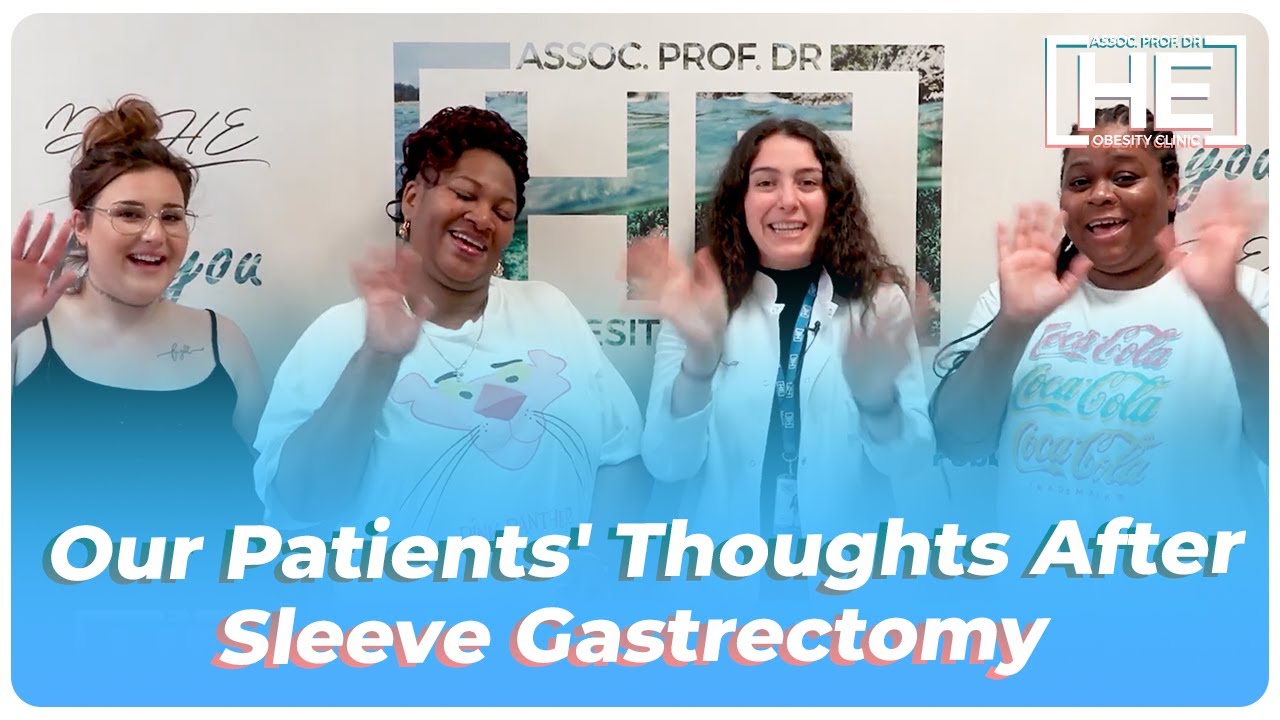Recovering from Vertical Sleeve Gastrectomy
Following vertical sleeve gastrectomy in Turkey, patients will undergo a period of recovery and adjustment as they adapt to their new dietary habits and lifestyle changes. The recovery process may involve:
1. Hospital Stay: Patients typically remain in the hospital for a few days following vertical sleeve gastrectomy to ensure proper monitoring and post-operative care.
2. Dietary Transition: Gradually transition from liquid to soft foods and eventually solid foods based on the guidance of the medical team.
3. Physical Activity: Engage in light physical activity as recommended by healthcare providers to promote healing and maintain overall well-being.
4. Follow-Up Appointments: Attend scheduled follow-up appointments with the surgeon to monitor progress, address any concerns, and receive ongoing support.
Vertical sleeve gastrectomy is an effective weight loss procedure that offers numerous benefits for individuals struggling with obesity. Turkey has emerged as a leading destination for vertical sleeve gastrectomy due to its affordable cost, high-quality healthcare facilities, experienced surgeons, and unique tourism opportunities. By carefully researching medical facilities and preparing for the surgical journey, patients can undergo vertical sleeve gastrectomy in Turkey with confidence and embark on a path towards improved health and well-being.
What is Vertical Sleeve Gastrectomy and How Does it Work?
Vertical sleeve gastrectomy (VSG) is a surgical procedure that involves the removal of a large portion of the stomach, leaving behind a small, sleeve-shaped stomach. This restricted stomach size significantly reduces the amount of food that can be consumed, leading to weight loss.
During the procedure, the surgeon removes approximately 80% of the stomach, leaving behind a long, tubular organ. This sleeve-shaped stomach is about the size of a banana and can hold significantly less food compared to the original stomach. By reducing the stomach's capacity, VSG helps individuals feel full faster and promotes portion control.
In addition to reducing the stomach's size, VSG also affects the production of hunger-inducing hormones. The portion of the stomach that is removed during VSG is responsible for producing a hormone called ghrelin, which stimulates appetite. When this portion of the stomach is removed, ghrelin production decreases, leading to a reduced appetite and decreased hunger levels.
Vertical sleeve gastrectomy is typically performed using minimally invasive techniques, such as laparoscopy. This approach involves making several small incisions in the abdomen and using specialized surgical instruments and a camera to guide the surgeon during the procedure. The use of laparoscopy results in smaller incisions, less pain, faster recovery, and reduced scarring compared to traditional open surgery.
Benefits of Vertical Sleeve Gastrectomy
Vertical sleeve gastrectomy offers a range of benefits for individuals struggling with obesity and related health issues. Let's take a closer look at some of the key advantages:
1. Significant and Sustainable Weight Loss
One of the primary benefits of VSG is significant and sustainable weight loss. Studies have shown that individuals can expect to lose an average of 50% to 70% of their excess weight within the first year after surgery. This weight loss continues over time, with many patients reaching their goal weight within 18 to 24 months.
2. Resolution or Improvement of Obesity-Related Health Conditions
In addition to weight loss, VSG has been shown to improve or resolve many obesity-related health conditions. Conditions such as type 2 diabetes, high blood pressure, sleep apnea, and high cholesterol often improve significantly or even go into remission after VSG. This improvement in health can lead to a reduced need for medications and a decreased risk of developing complications associated with these conditions.
3. Improved Quality of Life
Carrying excess weight can have a significant impact on an individual's quality of life. Physical limitations, low self-esteem, and a reduced ability to participate in activities can take a toll on both mental and emotional well-being. Vertical sleeve gastrectomy helps individuals regain their mobility, boost their self-confidence, and enjoy a better quality of life overall.
4. Reduced Risk of Mortality
Obesity is associated with an increased risk of mortality due to various health complications. VSG has been shown to reduce this risk, with studies indicating a significant decrease in mortality rates among individuals who undergo the procedure. By achieving significant weight loss and improving overall health, VSG can help individuals live longer, healthier lives.
Vertical sleeve gastrectomy offers numerous benefits for individuals struggling with obesity and related health issues. Some of the key benefits include:
1. Significant Weight Loss: Patients can expect to lose 50-60% of their excess body weight within the first 12-18 months following surgery.
2. Improvement in Obesity-Related Conditions: Many obesity-related conditions such as type 2 diabetes, high blood pressure, and sleep apnea show significant improvement or resolution after VSG.
3. Reduced Hunger: The removal of the portion of the stomach responsible for producing ghrelin leads to a decrease in appetite, making it easier for patients to adhere to dietary changes.
4. Simplified Eating Habits: With a smaller stomach capacity, patients naturally consume smaller portions and often find it easier to make healthier food choices.
5. Lower Risk of Nutritional Deficiencies: Unlike some other weight-loss surgeries, VSG does not involve rerouting or bypassing any part of the digestive system, reducing the risk of long-term nutritional deficiencies.
Risks and Complications of Vertical Sleeve Gastrectomy
While vertical sleeve gastrectomy is generally considered safe, like any surgical procedure, it does carry some risks and potential complications. It's essential to understand these risks and discuss them with your surgeon before deciding to undergo VSG. Some potential risks include:
1. Surgical Risks
As with any surgery, there is a risk of complications related to anesthesia, bleeding, infection, and blood clots. Your surgical team will take necessary precautions to minimize these risks, but it's crucial to be aware of them.
2. Leakage
Leakage is a potential complication that can occur after VSG. It happens when the staple line used to create the sleeve-shaped stomach doesn't heal properly, leading to the leakage of stomach contents into the abdominal cavity. This complication may require additional surgery to repair.
3. Nutritional Deficiencies
Due to the reduced stomach size and limited food intake, individuals who undergo VSG are at risk of nutritional deficiencies. It's important to follow a strict dietary plan and take recommended vitamins and supplements to prevent deficiencies and ensure optimal health.
4. Gastroesophageal Reflux Disease (GERD)
Some individuals may experience an increase in acid reflux symptoms after VSG. This can be managed with lifestyle modifications, medications, or, in some cases, additional surgical interventions.
It's crucial to discuss these risks with your surgeon and understand the potential complications associated with VSG. Your surgeon will assess your individual circumstances and guide you through the decision-making process.
While vertical sleeve gastrectomy is generally considered safe, it is important for individuals considering this procedure to be aware of potential risks and complications. Some of these include:
1. Bleeding or Infection: As with any surgical procedure, there is a risk of bleeding or infection at the incision sites or within the abdominal cavity.
2. Leakage Along the Staple Line: The newly created stomach sleeve is sealed with staples, and in some cases, leakage along this staple line can occur, requiring additional intervention.
3. Stricture: Narrowing of the stomach sleeve can occur, leading to difficulty in swallowing and requiring further treatment.
4. Gastroesophageal Reflux Disease (GERD): Some patients may experience worsening or new onset of GERD symptoms following VSG.
5. Long-Term Success: While many patients experience significant weight loss and improvements in health following VSG, long-term success depends on adherence to lifestyle changes and ongoing medical follow-up.
Common Complications of Vertical Sleeve Gastrectomy
Like any surgical procedure, vertical sleeve gastrectomy carries certain risks and complications. It's crucial to discuss these with your healthcare provider before making a decision. Some of the common complications associated with vertical sleeve gastrectomy include:
- Infection: Infection can occur after surgery, particularly at the incision sites. This can lead to pain, redness, swelling, and fever. Prompt medical attention is necessary to prevent the spread of infection and ensure proper healing.
- Bleeding: During the surgery, there is a risk of bleeding. While rare, excessive bleeding may require a blood transfusion or additional surgical intervention.
- Leaks: A potential complication of vertical sleeve gastrectomy is the development of leaks along the stapled lines where the stomach was divided. These leaks can lead to infection, abscesses, or other serious complications that may require further surgical intervention.
- Blood Clots: Surgery increases the risk of blood clots, which can lead to deep vein thrombosis (DVT) or even pulmonary embolism. It is important to adhere to prescribed medications, wear compression stockings, and engage in early mobilization to minimize the risk of blood clots.
Recovery and Lifestyle Changes
Following vertical sleeve gastrectomy, patients typically spend 1-2 nights in the hospital for monitoring and pain management. Most individuals can return to work and normal activities within 2-4 weeks, although strenuous exercise should be avoided during the initial recovery period.
In terms of dietary changes, patients will initially follow a strict liquid diet for a few weeks before gradually transitioning to pureed foods and then solid foods. It is crucial for individuals to adhere to dietary guidelines provided by their healthcare team to ensure proper healing and long-term success.
Long-Term Outcomes
The long-term success of vertical sleeve gastrectomy is closely tied to lifestyle changes and ongoing support from healthcare providers. Patients are encouraged to engage in regular physical activity, make healthy food choices, and attend follow-up appointments to monitor their progress and address any concerns.
Studies have shown that many individuals maintain significant weight loss and improvements in obesity-related conditions years after undergoing VSG. However, it is important to note that individual results may vary, and ongoing commitment to lifestyle changes is essential for sustained success.
Long-term Weight Loss and Maintenance after Vertical Sleeve Gastrectomy
Vertical sleeve gastrectomy is a powerful tool for weight loss, but long-term success requires ongoing commitment and lifestyle changes. Here are some key factors that contribute to long-term weight loss and maintenance after VSG:
1. Healthy Eating Habits
Following a healthy and balanced diet is crucial for long-term weight loss and maintenance. This includes consuming nutrient-dense foods, avoiding processed and high-calorie foods, and practicing portion control. Working with a dietitian can help you develop a personalized meal plan that meets your nutritional needs and supports your weight loss goals.
2. Regular Physical Activity
Physical activity plays a vital role in maintaining weight loss and overall health. Regular exercise can help increase calorie burn, build lean muscle mass, improve cardiovascular fitness, and boost metabolism. Aim for at least 150 minutes of moderate-intensity aerobic exercise each week, along with strength training exercises to maintain muscle mass.
3. Support and Accountability
Having a strong support system and accountability can greatly enhance your long-term success. Consider joining support groups, participating in online communities, or seeking the guidance of a therapist or counselor who specializes in weight management. These resources can provide valuable encouragement, motivation, and guidance throughout your journey.
4. Mindful Eating and Emotional Well-being
Practicing mindful eating and addressing emotional well-being are essential components of long-term weight loss and maintenance. Paying attention to hunger and fullness cues, identifying emotional triggers for overeating, and developing healthy coping mechanisms are crucial for sustainable success.
5. Regular Follow-up Care
Continued follow-up care with your bariatric surgeon and dietitian is essential for long-term success. These appointments allow your healthcare team to monitor your progress, assess nutritional status, and provide guidance and support. Regular monitoring of weight, lab values, and overall health can help identify and address any potential challenges or issues.
Success Stories and Patient Testimonials
Vertical sleeve gastrectomy has transformed the lives of countless individuals struggling with obesity and related health issues. Here are a few inspiring success stories and patient testimonials:
Success Story 1: Sarah's Journey to a Healthier Life
Sarah, a 36-year-old mother of two, had struggled with obesity for most of her adult life. After trying countless diets and exercise plans without success, she decided to explore the option of vertical sleeve gastrectomy. Since undergoing VSG surgery, Sarah has lost over 100 pounds and experienced a significant improvement in her overall health. She no longer requires medication for her type 2 diabetes, and her energy levels have soared. Sarah credits VSG for giving her a new lease on life and the confidence to pursue her dreams.
Success Story 2: John's Path to Overcoming Sleep Apnea
John, a 45-year-old executive, had been battling severe sleep apnea for years due to his weight. His doctor recommended vertical sleeve gastrectomy as a potential solution. After undergoing VSG surgery, John experienced a remarkable improvement in his sleep apnea symptoms. He no longer requires a CPAP machine and wakes up feeling refreshed and energized. The weight loss and overall health improvements he achieved through VSG have had a profound impact on his professional and personal life.
These success stories are just a glimpse into the life-changing potential of vertical sleeve gastrectomy. Each individual's journey is unique, and the outcomes may vary. However, the common thread is the transformative impact that VSG can have on weight loss, health, and overall well-being.
Conclusion and Final Thoughts on Vertical Sleeve Gastrectomy
Vertical sleeve gastrectomy offers hope for individuals struggling with obesity and related health issues. This transformative weight-loss surgery has been proven to help individuals achieve significant and sustainable weight loss, improve or resolve obesity-related health conditions, and enhance overall quality of life.















COMMENTS FROM REAL PATIENTS
“An exceptional experience from start to end! Prof H. Erdem, doctors,nurses,nutritionists, dieticians, co-ordinaters and all the rest of the staff are simply amazing. They attend patients with patience and give attention to every query they have.Their lovely smiles and warmth was more then enough to make my stay an exceptional one. Now I look forward to the weightloss journey with their professional guidance. Heartfelt thanks to all! Will surely recommend.”
Posted on
Trustpilot“Very good before and aftercare. Lots of pre and post op information and support. Team were responsive to any issues that arose and made me feel safe. Each day that I was in hospital the team came to check on me (sometimes 3 times in a day), in addition to the core checks by the nurses. Pre and post op I was put in a WhatsApp group with the surgical team for additional and personal support. There was also a group for other post surgery people to support and uplift each other. Dr Hasan and team gave me such care that without reservation I give my recommendation. Even now 3 years later, I'm still having messages of support and encouragement from the patient liaison Tugce.”
Posted on
Trustpilot“I have just returned from having a gastric sleeve. I cannot fault the care and service I've had from the whole team at Dr. HE obesity clinic. I was given all the information I needed before I went and all my questions were answered, no matter what time I messaged. When I arrived at the hospital everyone was so friendly and caring. The hospital was clean and hygienic. My room was cleaned every day while I was there. I felt listened too and cared for throughout my stay. Everyone is so helpful. Another positive is they are there for you when you return back to the UK, to answer any questions you may have and support you when needed. Excellent service all round.”
Posted on
Google"After struggling with my weight for years, I decided to try the Allurion Balloon at GST Clinic in Turkey. The cost was much more affordable than back home, and the care I received was top-notch. From the moment I arrived, the team made me feel comfortable and informed. Three months later, I've lost a significant amount of weight and feel fantastic. I highly recommend the Allurion Gastric Balloon treatment here!"
Posted on
Google"I had my Allurion Gastric Balloon placed at GST Clinic, and it was the best decision I ever made. The procedure was quick, and there was no downtime. The staff were incredibly supportive, providing me with all the guidance I needed for a successful treatment. The cost was transparent, and there were no hidden fees. It’s been a life-changing experience!"
Posted on
Google"Choosing the Allurion Balloon from GST Clinic was a pivotal moment in my weight loss journey. The cost of the Allurion Balloon in Turkey was reasonable, and the service at the clinic was exceptional. They provided a comprehensive package that included follow-up care and nutritional advice, which really helped me make the most out of the 16 weeks with the balloon."
Posted on
Trustpilot"The Allurion Balloon cost in Turkey at GST Clinic was worth every penny. The team not only helped me with the medical procedure but also supported me emotionally throughout my journey. Losing weight has never felt this manageable, and I have GST Clinic to thank for this new lease on life."
Posted on
star"My experience with the Allurion Balloon at GST Clinic was nothing short of amazing. The staff were professional and caring, and the price of the treatment was clear from the start. The balloon helped me control my eating habits, and I saw results faster than I anticipated. I would definitely recommend GST Clinic to anyone considering the Allurion Balloon in Turkey."
Posted on
Trustpilot